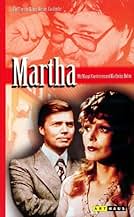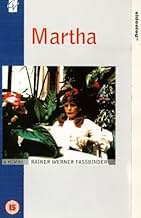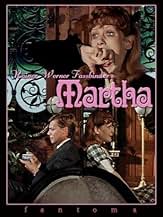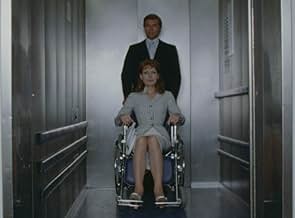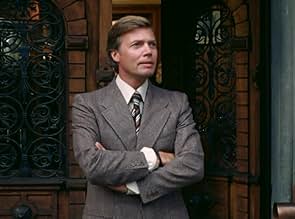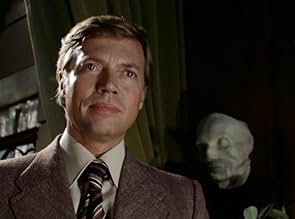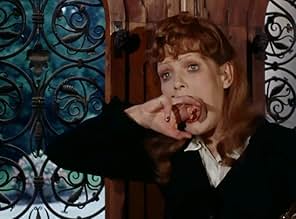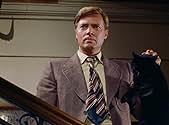PUNTUACIÓN EN IMDb
7,5/10
3,2 mil
TU PUNTUACIÓN
Tras la muerte de su padre, un abusador, Marta, una bibliotecaria solitaria, se casa con un hombre igualmente despreciable: Helmut.Tras la muerte de su padre, un abusador, Marta, una bibliotecaria solitaria, se casa con un hombre igualmente despreciable: Helmut.Tras la muerte de su padre, un abusador, Marta, una bibliotecaria solitaria, se casa con un hombre igualmente despreciable: Helmut.
- Dirección
- Guión
- Reparto principal
- Premios
- 1 premio y 1 nominación en total
Michael Ballhaus
- Restaurant guest flirting with Martha
- (sin acreditar)
Peter Berling
- Taxi Driver
- (sin acreditar)
Reseñas destacadas
Martha, the titular character of Rainer Fassbinder's 1974 made for TV (but nonetheless acclaimed) film Martha is the kind of character I detest more than any other. If there is one characteristic that defines her it is weakness. Her weakness can be seen from the very beginning, as an early scene shows her as she runs away from an emergency situation. Later, shortly after the death of her father, she begins to try things that her father had forbid her to do; thus it becomes clear that her will has been subsumed by that of her parent. Nonetheless, Martha leads a fairly happy life until she marries a domineering sadist. A good portion of the film portrays her sickening subservience to this petty tyrant and the pitiful efforts she makes to change her situation inevitably worsen it because they are so passive and ineffectual. The plot of this film makes for a maddeningly unpleasant viewing experience.
At the same time, Fassbinder's film-making powers are never less than formidable, particularly in some of the earlier sequences here. Fassbinder sets the early, happy scenes in vast, richly decorated interiors. There are a lot of interesting juxtapositions created through the use of mirror images and unusual angles. Exterior scenes are also visually sumptuous, a bit like the work of French New Wave director Eric Rohmer, Academy ratio and all. Later, as the film turns more miserable the interiors seem to shrink and their uniform lack of design reflect Martha's new hopelessness. The exteriors seem to grow into vast wildernesses at the cost of their former beauty. Needless to say, Fassbinder is adept at using a character's surrounding (and the mise en scene) to suggest that character's mood.
This is the third Fassbinder film I've seen and I must say that while I haven't been blown away by any of his films, his direction remains a strong point in each one. No doubt I'll eventually see one where the other aspects of the film are just as satisfying as the direction. Martha is not that film but it does increase my appreciation for Fassbinder's artistry.
At the same time, Fassbinder's film-making powers are never less than formidable, particularly in some of the earlier sequences here. Fassbinder sets the early, happy scenes in vast, richly decorated interiors. There are a lot of interesting juxtapositions created through the use of mirror images and unusual angles. Exterior scenes are also visually sumptuous, a bit like the work of French New Wave director Eric Rohmer, Academy ratio and all. Later, as the film turns more miserable the interiors seem to shrink and their uniform lack of design reflect Martha's new hopelessness. The exteriors seem to grow into vast wildernesses at the cost of their former beauty. Needless to say, Fassbinder is adept at using a character's surrounding (and the mise en scene) to suggest that character's mood.
This is the third Fassbinder film I've seen and I must say that while I haven't been blown away by any of his films, his direction remains a strong point in each one. No doubt I'll eventually see one where the other aspects of the film are just as satisfying as the direction. Martha is not that film but it does increase my appreciation for Fassbinder's artistry.
Two days ago I have seen this movie. Lead actor Karlheinz Boehm and famous filmmaker Volker Schloendorff were present in the audience, and then discussed it after the screening. This was part of (or spontaneously turned into) a fund-raising effort for the humanitarian organization that K.H. Boehm founded.
Boehm said that Fassbinder was an expert or at least naturally gifted in judging people. In the discussion it was also mentioned that in his theater group at that time he had also built a network of dependencies. Boehm was very impressed by a quote from Fassbinder, saying approximately: In general you have to exaggerate something to unleash the full power and achieve maximum artistic effect, however it is important to do it correctly (do not exaggerate too much). Here this principle has been applied to demonstrate the (one-sided) struggle for power and dominance in a marriage. At the beginning the husband is very male, that is outspoken, direct, almost blunt. Martha seems to be in love for quite a while. Later, the requests of the dominant, violent husband become increasingly over the top, so that watching the sadist makes you feel uneasy. The same holds for Marthas friends and relatives which are unable to help or, with the exception of Herr Kaiser, even realize the truth about Marthas personality being gradually ruined. This is criticism of an emotionally degraded society.
However, from a aesthetic standpoint, camera and light are marvelous. The set locations (typical for wealthy people) have also been carefully selected and are amazing in their false, pompous colorfulness. In places, there is also quite a bit of black humor mixed in, and at the beginning it seemed like a mystery story (the black guy chasing Martha)or a love story.
Aside from that , the movie also reminded me of a 1950s Bergman marriage movie. Worth seeing.
Boehm said that Fassbinder was an expert or at least naturally gifted in judging people. In the discussion it was also mentioned that in his theater group at that time he had also built a network of dependencies. Boehm was very impressed by a quote from Fassbinder, saying approximately: In general you have to exaggerate something to unleash the full power and achieve maximum artistic effect, however it is important to do it correctly (do not exaggerate too much). Here this principle has been applied to demonstrate the (one-sided) struggle for power and dominance in a marriage. At the beginning the husband is very male, that is outspoken, direct, almost blunt. Martha seems to be in love for quite a while. Later, the requests of the dominant, violent husband become increasingly over the top, so that watching the sadist makes you feel uneasy. The same holds for Marthas friends and relatives which are unable to help or, with the exception of Herr Kaiser, even realize the truth about Marthas personality being gradually ruined. This is criticism of an emotionally degraded society.
However, from a aesthetic standpoint, camera and light are marvelous. The set locations (typical for wealthy people) have also been carefully selected and are amazing in their false, pompous colorfulness. In places, there is also quite a bit of black humor mixed in, and at the beginning it seemed like a mystery story (the black guy chasing Martha)or a love story.
Aside from that , the movie also reminded me of a 1950s Bergman marriage movie. Worth seeing.
A selfish, immature and hysterical woman is progressively destroyed psychologically by a sadistic husband. In line with other Fassbinder movies, such as die Ehe der Maria Braun, this movie depicts a bourgeoisie only interested in money and keeping up appearances, where love is impossible. Beautifully filmed in particular in a baroque house, the effect of the movie is reinforced by the apparent kindness of the husband and its constant reference to love.
Yes, hysterical as in exaggerated comedy, and hysterical as in the title character freaking out over her bizarre, ever-degenerating marriage. This is great Fassbinder film-making--the performances, cinematography, and dialogue are brilliant. As in many of his films, Fassbinder takes a perverse joy in keeping the audience balanced between comedy and melodrama, the laughs always tinged with apprehension. The colors are dominated by lurid reds. The arc of the story keeps one queasy as to how horrible the outcome might be.
The famous Sirk influence is very obvious in this as in many of RF's early 70's films, but what struck me is the equally obvious influence of Bunuel on Fassbinder's movies. "Martha" owes a great deal to "Belle du Jour" and "Tristana" among many other of the Spanish master's films about the natural perversity of male-female relationships.
The famous Sirk influence is very obvious in this as in many of RF's early 70's films, but what struck me is the equally obvious influence of Bunuel on Fassbinder's movies. "Martha" owes a great deal to "Belle du Jour" and "Tristana" among many other of the Spanish master's films about the natural perversity of male-female relationships.
More Fassbinder goodness with this 1974 film as we see the central character start out as a happy go lucky woman who feels pressurised to find a man, settle down and adjust to married life. Her own parents are revealed to be in a loveless marriage until Martha's father collapses and dies when he is with his daughter on holiday in Italy.
I'm not going to give away too much about the plot and what happens during the course of the movie as I don't want to blunt the impact of the film but all I'll say is that this is a dark piece of cinema! And I mean DARK!
As the concept of coercive control is just starting to be spoken about in the popular media, Fassbinder had made a film about it 1974. And gaslighting. And marital sadism.
A special mention needs to go to Margit Carstensen in the lead role whose performance is nothing short of astonishing as we see her character's spirit and very existence being destroyed and disintegrating before our very eyes.
I also didn't know that Karlheinz Bohm had ever depicted a darker character than his star turn in Michael Powell's Peeping Tom. I was sooo wrong! His character here is a sadistic psychopath/narcissist and acted to grimy and reptilian perfection.
I remember when I saw the movie Threads for the first time. I thought to myself that it couldn't get any darker but then saw that that it was only halfway through it's running time. I then saw that it could get MUCH darker! The same happened when I watched Martha.
This does for marriage and societal expectations for women what Jaws did for sharks. When I watched this I kept thinking to myself 'I'm so glad that I'm gay. And that I'm happily single!'
I'm not going to give away too much about the plot and what happens during the course of the movie as I don't want to blunt the impact of the film but all I'll say is that this is a dark piece of cinema! And I mean DARK!
As the concept of coercive control is just starting to be spoken about in the popular media, Fassbinder had made a film about it 1974. And gaslighting. And marital sadism.
A special mention needs to go to Margit Carstensen in the lead role whose performance is nothing short of astonishing as we see her character's spirit and very existence being destroyed and disintegrating before our very eyes.
I also didn't know that Karlheinz Bohm had ever depicted a darker character than his star turn in Michael Powell's Peeping Tom. I was sooo wrong! His character here is a sadistic psychopath/narcissist and acted to grimy and reptilian perfection.
I remember when I saw the movie Threads for the first time. I thought to myself that it couldn't get any darker but then saw that that it was only halfway through it's running time. I then saw that it could get MUCH darker! The same happened when I watched Martha.
This does for marriage and societal expectations for women what Jaws did for sharks. When I watched this I kept thinking to myself 'I'm so glad that I'm gay. And that I'm happily single!'
¿Sabías que...?
- CuriosidadesBecause of legal reasons, the film wasn't shown for over 20 Years. Cornell Woolrich right holders claimed that the film has a lot similarities to one of his novels. Fassbinder replied, that he first read the story after filming was complete. Nevertheless Woolrich got a writing-credit. The first German screening of a restored edition was in November 1997.
- Citas
Helmut Salomon: [after forcing his wife to read an obscure book on dam technology and listen to his favorite music] See, Martha? Those things can be fun.
- ConexionesFeatured in Fassbinder in Hollywood (2002)
Selecciones populares
Inicia sesión para calificar y añadir a tu lista para recibir recomendaciones personalizadas
Detalles
- Fecha de lanzamiento
- País de origen
- Idiomas
- Títulos en diferentes países
- Марта
- Localizaciones del rodaje
- Constance, Baden-Württemberg, Alemania(Martha and M. Kaiser by the lake)
- Empresas productoras
- Ver más compañías en los créditos en IMDbPro
Taquilla
- Presupuesto
- 500.000 DEM (estimación)
Contribuir a esta página
Sugerir un cambio o añadir el contenido que falta

Principal laguna de datos
By what name was Martha (1974) officially released in Canada in English?
Responde
